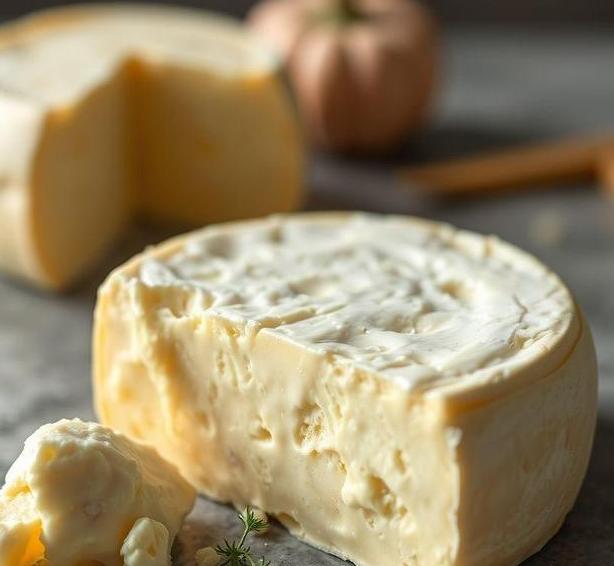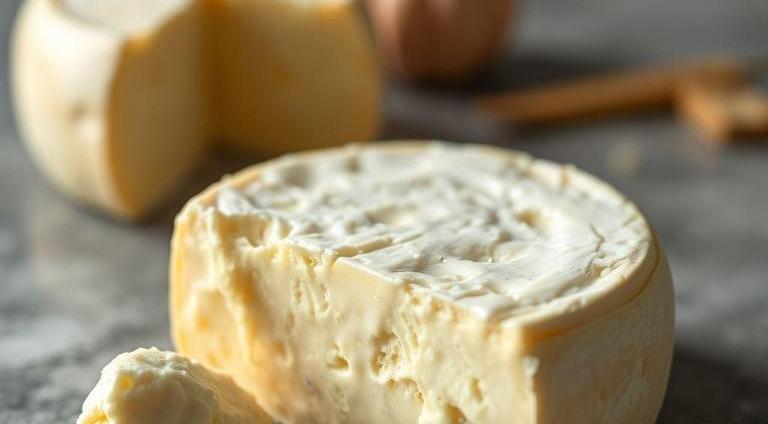Brie cheese, often referred to as the "Queen of Cheeses," is one of the most beloved soft, creamy cheeses worldwide. Originating from the Île-de-France region of France, it has a delicate, velvety texture with a mild, nutty flavor that pairs beautifully with fruits, crackers, and even wine. Its signature white, bloomy rind is a hallmark of quality. But like all perishable foods, Brie cheese has a shelf life, and improper storage can lead to spoilage. For anyone who’s ever opened a refrigerator to find an untouched wedge of Brie, wondering whether it’s still safe to eat or has gone bad, this guide is here to help!
In this article, we’ll dive deep into all things Brie, addressing some common questions and offering tips on storage, shelf life, and the signs that indicate it’s time to toss that once-beautiful wheel. So, whether you’re a casual Brie enthusiast or a self-proclaimed cheese connoisseur, let’s explore how to make the most of this luxurious cheese before it loses its charm.
Can Brie Cheese Go Bad?
Absolutely, Brie cheese can go bad, just like any fresh dairy product. While Brie has a longer shelf life than some other cheeses due to its high moisture content and rich flavor profile, it’s still susceptible to spoilage over time. Brie’s soft texture and the naturally occurring molds on its rind are part of what makes it so delightful-but they can also contribute to the cheese’s eventual decline if not stored or consumed properly.
Shelf Life For Brie Cheese

Knowing the shelf life of Brie is essential to avoid food waste and ensure the best taste experience. The shelf life varies based on whether it’s unopened or opened, as well as how it’s stored.
-
Unopened Brie Cheese
- Typically lasts 1 to 2 weeks past the “use by” or “sell by” date on the packaging, assuming it’s stored properly in the fridge. However, it can sometimes stay good for an additional week or two if stored in optimal conditions.
-
Opened Brie Cheese
- Once opened, Brie cheese should ideally be consumed within 5 to 7 days. The cheese starts losing its freshness, flavor, and texture after opening, and the more it’s exposed to air, the quicker it will degrade.
-
Homemade Brie
- For homemade Brie, the shelf life can be much shorter. It’s best to eat it within a week, as it doesn’t have preservatives that commercial versions often contain.
If you want to maximize its longevity, make sure that Brie is kept cool and properly wrapped. It can be kept in the fridge for a bit longer, but you might notice changes in texture, smell, and taste over time.
Common Signs Of Spoilage
Brie is a delicate cheese, and it’s pretty easy to tell when it’s past its prime. While it’s tempting to try one more bite, it’s important to recognize the signs of spoilage to avoid consuming something that could make you sick or just ruin your culinary experience. Here are the key signs that your Brie has gone bad:
-
Off-Smell
- Fresh Brie should have a mild, slightly earthy smell, with no sharp or unpleasant odors. If your cheese smells sour, rancid, or strongly ammonia-like, it’s no longer safe to eat.
-
Discoloration
- The rind of Brie is naturally white, sometimes tinged with pale yellow or gray. If the rind has turned a deep yellow, orange, or brown, or if there are dark patches of mold (other than the white bloomy kind), that’s a sign that the cheese has spoiled.
-
Mold (Other Than White Bloom)
- While Brie’s rind is covered in edible mold, any mold that appears on the body of the cheese (inside, under the rind) should be avoided. Green, blue, or black mold is a strong indicator that the cheese has gone bad.
-
Texture Changes
- Brie should be soft, but it shouldn’t be runny or slimy. If the cheese feels excessively mushy or has developed a slimy surface, it’s a sign that it’s no longer good.
-
Taste
- Brie’s flavor should be creamy, mild, and slightly nutty. If you taste it and notice any sour, overly pungent, or rancid flavors, it’s best to discard it.
-
Excess Liquid
- If your Brie is sitting in a puddle of liquid, particularly one that’s separated from the cheese, it’s likely past its prime. Fresh Brie should be moist but not swimming in liquid.
How To Store Brie Cheese?

Proper storage is key to extending the life of your Brie. Here are the best practices to store Brie cheese and keep it as fresh as possible:
-
Keep It Wrapped
- Brie should be wrapped in wax paper, parchment paper, or plastic wrap. Avoid using aluminum foil, as it can impart a metallic taste to the cheese. After wrapping, place it in an airtight container or a resealable plastic bag to limit air exposure.
-
Refrigeration Is A Must
- Always store Brie in the fridge at a temperature between 34°F and 38°F (1°C to 3°C). The cold temperature will slow down the spoilage process but won’t completely halt it. Keep it in the main compartment of the fridge (not the door) for more consistent temperature control.
-
Use A Cheese Drawer (if Possible)
- If your fridge has a cheese drawer, use it! These drawers often maintain a slightly higher humidity level, which can help preserve the texture and moisture of Brie.
-
Keep It Away From Strong-Smelling Foods
- Brie can absorb odors from other foods, so keep it away from strong-smelling items like onions, garlic, or fish. This can also help maintain its delicate flavor.
-
Avoid Freezing (unless Necessary)
- Freezing Brie cheese is not recommended as it alters the texture significantly, making it grainy and unappealing once thawed. However, if you absolutely must freeze it, be sure to wrap it tightly and consume it within a month. Keep in mind that the texture will change after freezing, and it may not be suitable for serving fresh but will work in cooked dishes.
Expert Tips
-
Let It Warm Up Before Eating
- Brie tastes best at room temperature. Take it out of the fridge about 30 minutes to an hour before you plan to eat it. This allows its creamy, luscious texture and full flavor to shine.
-
Don’t Eat The Rind If It’s Too Bitter
- While the rind of Brie is typically edible and adds flavor, sometimes it can turn bitter, especially if the cheese has been stored for too long. If this happens, you can always peel the rind off before eating the soft interior.
-
Use Brie Quickly After Opening
- Brie has a short shelf life once opened. Plan to use it within a week, and always try to reseal the packaging tightly to minimize exposure to air and bacteria.
-
Save The Leftovers
- If you have leftover Brie that’s getting close to its expiration date, consider incorporating it into recipes like quiches, omelets, or even baked Brie in puff pastry. That way, you can enjoy its creamy goodness without waste.
-
Check For Authenticity
- If you’re looking for the best Brie, aim for authentic French Brie or artisanal local varieties. These tend to have better flavors, textures, and longevity compared to mass-produced options.
FAQs
Can Brie Cheese Go Bad If Left Out?
Yes, brie cheese can go bad if left out at room temperature for too long. Typically, brie should not be left out for more than 2 hours to prevent bacterial growth and spoilage.
How Long Does Brie Cheese Last In The Fridge?
Brie cheese can last about 1 to 2 weeks in the refrigerator if stored properly in an airtight container or wrapped in wax paper and plastic wrap.
What Are The Signs That Brie Cheese Has Gone Bad?
Signs that brie cheese has gone bad include a sour or ammonia-like smell, mold growth that is not part of the cheese’s natural rind, a slimy texture, and an off or rancid taste.
Can You Eat Brie Cheese Past The Expiration Date?
Brie cheese can often still be safe to eat a few days past its expiration date, as long as it shows no signs of spoilage like mold or unpleasant odors. However, it’s best to use your senses to judge its freshness.
Does Brie Cheese Spoil Faster Once Opened?
Yes, once opened, brie cheese has a shorter shelf life. It should ideally be consumed within 5 to 7 days for optimal freshness. After this time, its flavor and texture may degrade.
Can Mold On Brie Cheese Be Dangerous?
Mold that appears on the natural rind of brie cheese is usually harmless, as it is part of the aging process. However, mold that appears on the inner cheese or an off smell could indicate spoilage and should not be eaten.
How Should Brie Cheese Be Stored To Avoid It Going Bad?
To keep brie cheese fresh, store it in an airtight container or wrap it tightly in wax paper or parchment paper, then cover it with plastic wrap. Make sure to keep it in the coldest part of the fridge, away from other strong-smelling foods.
Can Brie Cheese Be Frozen To Extend Its Shelf Life?
While it is possible to freeze brie cheese, doing so can affect its texture and flavor. It’s best to eat brie fresh, but if freezing is necessary, wrap it tightly and consume it within 1 to 2 months for best results.
Why Does Brie Cheese Develop An Ammonia Smell?
An ammonia smell in brie cheese usually indicates that the cheese has over-ripened or has been improperly stored. This odor is typically a sign that the cheese has gone bad and should not be consumed.
Can Brie Cheese Cause Food Poisoning?
If brie cheese has spoiled, consuming it may lead to food poisoning symptoms like nausea, vomiting, or diarrhea. It’s important to ensure the cheese is still fresh before eating.